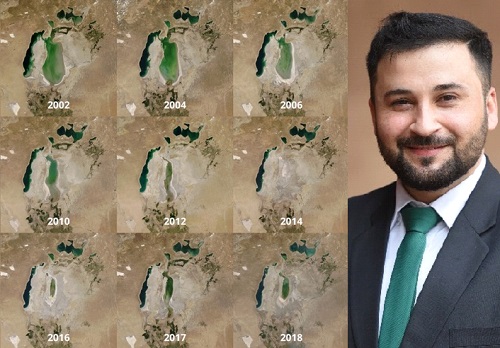 The Aral Sea region has been under severe climatic threat for many decades in Central Asia. The Aral Sea is drying up at a rapid pace, and it is gradually transforming into a salty desert. There is now natural unrest in the area’s regional life and habitat. This alarming situation is not going to end here – it is greatly impacting the rest of the world, including the earth’s Southern and Northern regions.
The Aral Sea region has been under severe climatic threat for many decades in Central Asia. The Aral Sea is drying up at a rapid pace, and it is gradually transforming into a salty desert. There is now natural unrest in the area’s regional life and habitat. This alarming situation is not going to end here – it is greatly impacting the rest of the world, including the earth’s Southern and Northern regions.
Ice zones and glaciers are melting. As seas dry out, the salt concentration in soil is increasing. These changes are creating a major threat to Mother Earth. Amid large-scale industrial production and extraction of natural resources, the idea of sustainability and climate change are inversely proportional to each other. There are two major causes of climatic unrest: a hunger for capital concentration, and global economic growth.
However, economic growth and questions related to the survival of life are contradictory to each other. At this critical juncture of human history, we need to structure a balance between economic growth and questions related to life on earth. Only then can we ensure sustainability.
Recently, I was invited to an International Conference to talk about the role of young people in solving issues related to sustainability and climate change. I heard about the terrible climatic conditions in the Aral region, and was very impressed by the Uzbek government’s initiatives to mitigate climate change issues.
The Uzbekistan Ministry of Innovative Development plays a commendable role regarding environmental protection. The Uzbek government’s international conference “Transformation of the Aral Sea Region into a zone of Environmental innovations and technologies” was a great achievement, and brought attention to the issue internationally by engaging various stakeholders from different parts of the world including global youth. I was honored as a Young Speaker to share my thoughts on the topic titled “Sustainability in the age of Climate Change: the Aral Sea, Youth Innovations and Partnership.”
On September 25, 2015, the United Nations adopted resolution 70/1 entitled “Transforming our world: the 2030 Agenda for Sustainable Development.” This resolution was a comprehensive, far-reaching and people-centered set of universal and transformative Sustainable Development Goals and targets that included: a commitment to working tirelessly for the full implementation of the Agenda by 2030; a recognition that eradicating poverty in all its forms and dimensions, including extreme poverty, is the greatest global challenge and an indispensable requirement for sustainable development; a commitment to achieving sustainable development in its three dimensions – economic, social and environmental – in a balanced and integrated manner, and; to build upon the Millennium Development Goals’ achievements and seek to address their unfinished business.
Today, there is a growing understanding in the world that the negative changes associated with the Aral Sea catastrophe pose a serious threat not only to Central Asian countries, but also to sustainable development on a global scale. The Aral Sea highlights worsening environmental disasters as it goes well beyond the region and represents a global concern, and creates a sense of urgency to combat climate change. We have the power and the knowledge to minimize the harm that has already been caused and restore the Aral Sea region – if we act now.
Currently, more than 50 per cent of the global population is youth. This population has great potential to make a huge impact on sustainable development, and create innovative solutions – including to the Aral Sea disaster and its consequences.
This young population can make an important impact on global affairs, and I recommend they be engaged through various dialogue series and workshops that focus on how to turn the Aral Sea region into a zone of environmental innovations and technologies. These dialogues and workshops must cover a number of topics on green recovery, international support in Aral Sea region development, ecologically-oriented regional development, afforestation activities at the Aral Sea bed, and many others.
Furthermore, there is also a need to initiate programs that aim to encourage sustainable living in the Aral Sea region through building the capacity of teachers, empowering local communities and mobilizing children – most importantly, rural youth.
I recommend that both the Central Asian and international governments create the following initiatives:
⦁ Support the Aral region’s rural youth entrepreneurship in farming. There is a need to initiate such programs that focus on the capacity of young farmers and entrepreneurs to develop agriculture, manufacturing, and service delivery which is expected to improve the economic well-being of vulnerable communities.
⦁ Develop training opportunities and strong economic incentives for young entrepreneurs, and ease restrictions on registration of businesses and access to financing.
⦁ Empower rural youth and increase awareness of modern agricultural techniques such as: drip line installation to promote sustainable, water efficient farming, etc.
⦁ Integrate rural and urban youth through various exchange programs, conferences, workshops and innovative ideas (for example, arts and poetry competitions focused on the Aral transformation with various themes like “Rebirth for the Aral.”)
⦁ Bring together rural and urban youth socially (youth must be motivated to establish a youth-based organization that can make decisions and generate articles for electronic and print media, particularly regarding issues from a youth perspective.)
⦁ Establish an “Aral Youth Parliament,” which will be a mock parliament of young people from the Aral region and serve as a space to debate and formulate innovative policies related to the transformation of the Aral Sea region. These innovative policies will help the policy makers, head of states and relevant stakeholders take necessary initiatives.
⦁ Organize environmental events such as large-scale tree planting and sanitary cleanups. These events will educate young people and provide a space for planting fruit and popular trees which will metabolize harmful toxins, revitalize the local ecosystem as well as stabilize soil. The fruit (such as apples, apricots, plums, cherries) will also provide a sustainable source of nutrition for local inhabitants, many of whom suffer from anemia.
⦁ Help low-income families through charitable concerts and ethno-cultural festivals with the participation of foreign tourists.
⦁ Celebrate eco-festivals dedicated to International World Environment Day, Earth Day, Water Day, and provide regular educational seminars on environmental health, community culture, and healthy lifestyle.
⦁ Empower and encourage rural women. Women-focused projects will enable ordinary women to do extraordinary things. It will give them a voice, confidence, and knowledge for proper farming, water management, and landscape restoration practices that they can share with other women around the world. “They say if you teach a man, you teach just one person, but if you teach a woman, you teach a whole family and community.”(An African Proverb)
⦁ Promote local business and encourage youth by providing special interest-free loans to establish small-scale businesses, such as honey bee farming, which will contribute to increased biodiversity and healthy bee populations and serve a crucial role in crop pollination. Moreover, such projects will promote beekeeping and other green agribusiness sectors and ecotourism in the region, while improving food security and creating jobs.
Engaging International Youth Effectively:
⦁ Involve global youth by establishing various forums like “Friends of Aral Region.”
⦁ Create international summer schools that teach various topics such as “Revival of Aral Sea.”
⦁ Organize “Global Youth Innovative Forums/Competitions.” These forums and competitions will introduce the world’s most creative minds to the Aral Sea, and aim to crowdsource groundbreaking solutions to mitigate – and even reverse – land degradation in the Aral Sea and Central Asian dry lands.
⦁ Enhance the partnerships between Central Asian youth and global youth organizations, Youth Innovation Centers, and forums aiming to solve practical problems by attracting new knowledge and innovative technologies, and comprehensively introduce the principles of a “green” economy – preventing further desertification and environmental migration.
⦁ Organize international games, such as a marathon called “Run for Aral Sea,” across various capitals around the world.
We must recognize the vital role that science, technology and innovation – including environmentally sound technologies – can play in development and facilitating efforts to address global challenges, such as efforts to protect the environment, accelerate the pace of economic diversification and transformation, improve productivity and competitiveness and ultimately support sustainable development. Youth from across the globe must be invited to present the innovative solutions based on science, technology and innovation for the issues of the Aral region.
International impact technology companies, like MC2 and M&C Consulting Inc., can develop edutainment special mobile gaming apps that will educate people – particularly children and youth – based on the UN SDGs Agenda, the Quebec Declaration on Ecotourism, and the Sustainable Development Concept of the Republic of Uzbekistan and other Central Asian countries. The content of the gaming app will focus on introducing the principles of sustainable development into the educational process, such as economic mechanisms for natural resources management, environmental management, ecotourism, green economy, environmental logistics and agro-ecology.
The international community needs to initiate, and continue to help with, improving efficiency and the implementation of innovations in the Aral Region by promoting smart and digital communities with favorable infrastructure for empowering youth, women, as well as vulnerable groups of people – including people with disabilities, families headed by single mothers and labor migrants.
With the international community’s support, various programs must be initiated that can help develop and implement environmentally-friendly technologies. This includes: integrated implementation of the principles of a “green” economy; environmentally-friendly, energy- and water-saving technologies and prevention of further desertification and environmental migration, and; development of ecotourism and other initiatives.
There is a need to involve youth-led organizations aimed at improving the ecosystem and sustainable life in saline lands, as well as a partnership with international organizations to develop and implement innovative solutions to various problems of saline environments of the drained bottom of the Aral Sea.
In conclusion, to quote:
“Today we are not talking about returning the Aral Sea, but at least overcoming its painful consequences for people, particularly youth. To minimize the disaster caused by this large-scale ecological disaster, we agree humans were the cause of the death of the Aral Sea, but now it can be the youth who will be able to return life to this land. Youth-made forests, which will rustle at the bottom of the former sea, will give hope for this. By actively involving young people, this land will be literally changing before our eyes, people will be getting clean drinking water, modern houses, roads, schools and hospitals will be built. Foreign investors will invest. The number of tourists from different parts of the world will be growing and there will be evidence of the revival of the Aral Sea with great prospects.”
About Author:
Qaiser Nawab is an award-winning strategic communications expert with nearly 10 years of experience as an advocate for social change. He is a freelance journalist and writes about global conflicts, particularly Central Asian. He is a youth Pakistani leader working globally for the Sustainable Development Goals and is the founder of the global youth organization “THE” Society International – (Together for Health and Education). He can be reached at qaisernawab098@gmail.com
(Editor’s Note: Qaiser Nawab was requested by Editor Tazeen Akhtar to participate in online conference by Ministry of Uzbekistan last week on 22 Nov 2021. He authored this article to speak in the conference. The article is open to be shared anywhere in Uzbekistan by GoUz or press and media orgs.)











